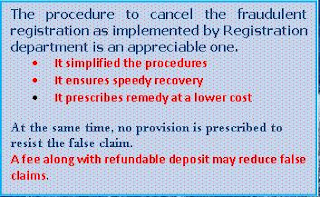 |
| To view the detailed article for Lawyers, Please Click here |
One, Mrs.Kanaka purchased a land in
Madippakkam in 1987 and she has not made building. As the plot was vacant for a
quite long time, it attracted the land grabbers.
As a result, they forged a document
purported to be the sale deed of 1987. They also created two fictitious
persons, named Mrs.Kanaka and her daughter Mrs.Murugavalli. Based on the forged
document, the impersonated Kanaka made a settlement deed, whereby she
transferred the subject land to the fictitious Murugavalli, and registered the
deed in SRO. This is fraudulent registration. Now, the original Kanaka wants to
cancel the fraud deed.
Another lady, named Mrs.Subhadra,
purchased a vacant land in 1990 from one Mr.Kumar, erected a building thereon
and is living in that house. In 2010, a stranger visited her house and
introduced himself as the agent of Kumar who sold the plot to Subhadra. He
showed the Power of Attorney, appointing him as agent. He also claimed that Subhadra
has not bought the plot from original Kumar. As such the sale became invalid.
And he asked her to vacate from house and land.
Later, it is found that the self
claimed agent was a fraudulent and the said Power of Attorney was fraudulently
registered by impersonation. Now, she
wants to cancel the GPA. Otherwise, the marketability of title shall be in
question.
It is not possible to register a
cancellation deed unilaterally as in the case of other deeds. It is considered
that a cancellation of registered deed by executants is against public policy
and also felt that by permitting the registration of cancellation deeds, the
vendors or executants shall misuse the provisions and allowing it would amount
to abuse of process of law.
The only remedy to the aggrieved
party was to approach the competent Civil Court, which is lengthier and
costlier one.
A curative remedy has been made by Registration
department of Tamil Nadu provides not only relief to the aggrieved party but
also prevents further fraud and cheating of innocent future purchasers. The mandatory
procedure confers power of Executive Magistrate on District Registrar to make
inquiry and to pass orders to annul the fraudulent registration.
The aggrieved party shall lodge a
complaint through Sub Registrar concerned to District Registrar, who shall conduct
an inquiry. On inquiry if it is proved that the subject registration has taken fraudulently,
the DR shall pass orders to this effect that the registration is annulled.
The DR shall complete the enquiry
within two months and if the parties are not appearing for two summons,
ex-parte order shall be passed.
In light of the above procedure, it
is advised that the aggrieved party may prepare a detailed petition, preferably
with the help of a property lawyer, giving
·
All the facts, documents and evidences
showing the title of the petitioner
·
Full details about the fraudulently
registered documents and
·
Clearly evidencing the fact of fraud of
impersonation, false representation, admission, false documents and evidences
The recital of the petition shall
be precisely prepared so as to enable the authority to form an idea about the
fraud happened which would lead to the right decision at an early stage.
As the DR deals with
the cases specific to the fraudulent registrations alone, the number of cases
are less as compared to that in Civil Courts. As such, a speedy recovery can be
expected and ensured at a cheaper cost.
But at the same time, the public shall not make baseless and worthless
false claims and complaints as the cost of complaining is low
For further reference, suggestion, opinion, visit
To get legal opinion on Title and other aspects, mail to

